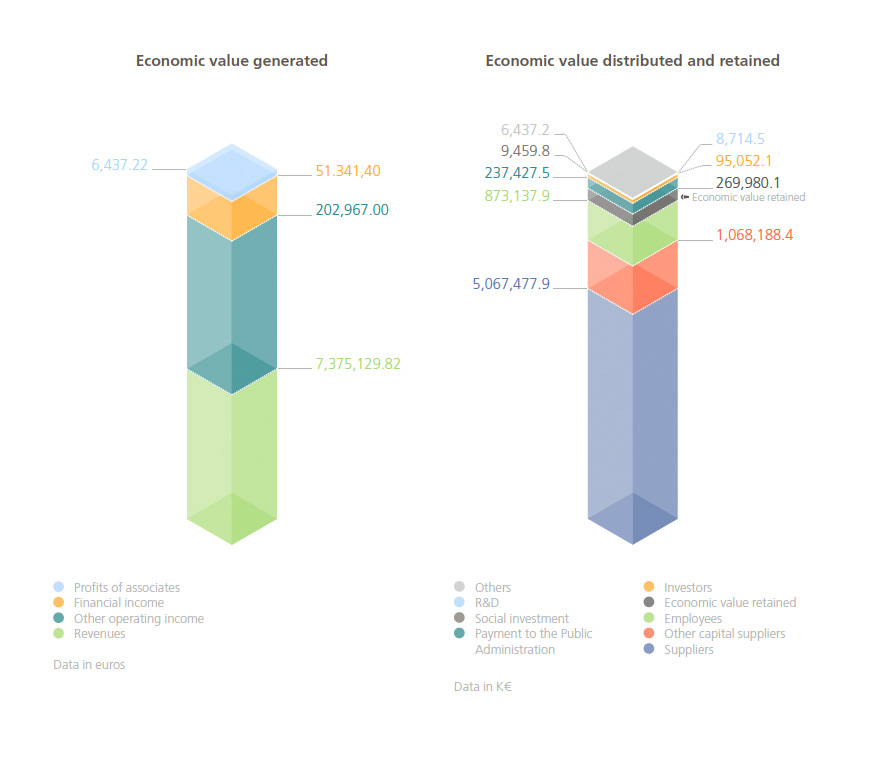Connecting with the social environment
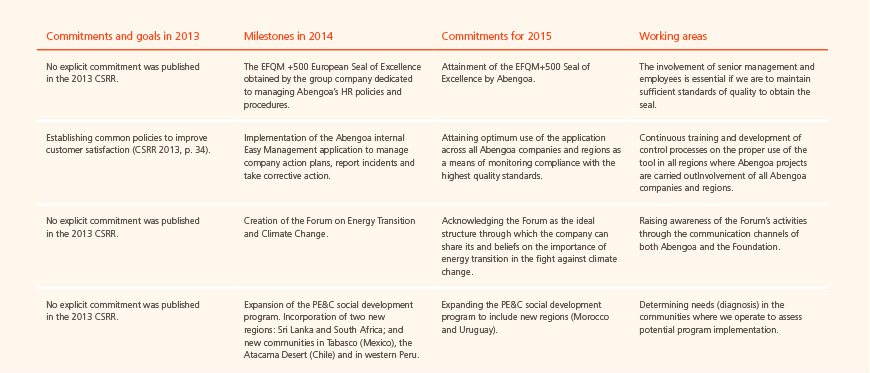
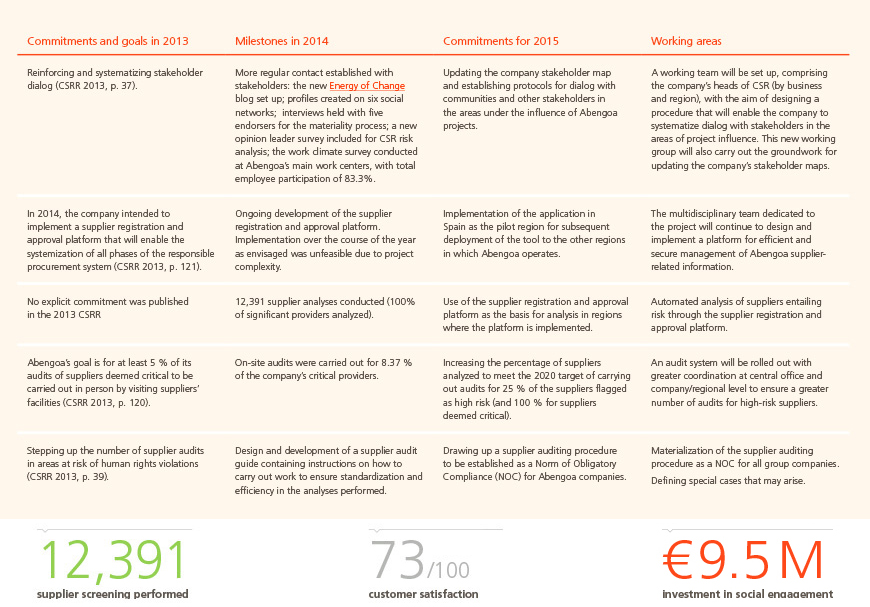
We manage our stakeholder relations with a view to generating positive impacts on the environment
In an increasingly more global and interconnected world, the manner in which the company interacts with its surroundings can lead to economic profits or losses, while also triggering positive or negative effects for the players with whom the company interacts. Companies need to maintain stable and beneficial relationships with all the economic and social agents with whom they collaborate. Businesses need to manage the impacts, both positive and negative, on these players as an essential part of maintaining their “social license to operate”.1
An increased perception of the impact of companies on their environment, coupled with the fact that companies can and do influence their supply chains and customers can and should be involved in corporate decisions, means that it is key to view corporate strategy and performance in terms of how they tie in with the social environment.
It is worth noting that the company’s relationship with the component members of its value chain is structured around the company’s communication channels2, through which Abengoa is able to determine the main impacts of its operations and address the concerns of each member.
Abengoa is present in the following social networks:

Note 1 Social license to generate refrs to the acceptamce of a project (be it commercial or non- profit) by a community. This license is linked to local perceptions with respect to the organization and therefore involves transparency, honesty, respect, ethics and impact mitigation effords carried out by the company.
Nota 2 Appendix C contains a diagram showing the company’s most relevant communication channels by stakeholder.
Reds go Green Competition
Towards the end of 2014, Abengoa and Manchester United launched a monthly contest as a product of their joint collaboration agreement. This initiative gives participants the chance to win a trip for two to attend a Manchester United match (including two tickets, transport and accommodation).
Contest winners are selected from among those who correctly answer a series of questions relating to renewable energy sources, climate change and responsible management. Answers to the questions can be found in the Abengoa blog.
Through this initiative, Abengoa and Manchester United seek to advance society’s knowledge of renewable energy sources, innovation, technology and sustainability.

Our suppliers are essential to achieving business success
Basic guidelines for supplier management
Outsourcing: which makes it possible to concentrate on knowledge improvement, increasing core business yield, incorporating highly professional service through the direct involvement of suppliers in day-to-day operations.
Leadership: ongoing pursuit and contracting of suppliers who are leaders in their sector ensures innovative and technology-heavy solutions focused on improvement, which enables Abengoa to maintain its high levels of competitiveness and quality.
Globalization: contracting common suppliers across the different production centers allows for a more developed and homogenous service with common scopes. These synergies facilitate global solutions that result in cost optimization when managing and developing the company’s service and its purchasing process.
Local development: the focus on development and involvement of locally-based suppliers ensures that the most essential and basic needs are met, with the resulting flexibility in consumption volume and response time. All of this has a positive impact on commercial and industrial growth in the regions of implementation and ensures close relations with these regions.
Integration of proposed improvements from suppliers allows for continuous progress in productivity and yield. Pricing according to results is a fundamental principle of commitment to the business, in conjunction with integration, environmental safety policy, respect for human rights and business ethics.
This chapter describes the main activities carried out by the company in terms of relations with suppliers, customers, the communities where it operates and society at large, the aim being to explain how the company is working to minimize its negative impacts and boost its positive impacts.
Commitment to responsibility along the supply chain
Abengoa treats its suppliers and subcontractors as essential partnersthat are key to business development and to competing successfully in the market. Each day, the company works toward forging and reinforcing relationships based on trust and mutual benefit, not only to ensure the quality of the company’s products and services, but also to promote a culture of responsible management and to foster ethical conduct.
The company lends particular importance to its own responsibility throughout the supply chain, due to its international presence in developing countries, the large number of suppliers with which it collaborates and the importance of these providers in carrying out company operations. For this reason, Abengoa pays particular attention to establishing, promoting and maintaining high standards of social responsibility in its lines of activity, promoting observance of ethical, labor, environmental and health and safety standards among its suppliers, while at the same time promoting efficiency in generating products and services with high quality standards, lowering costs and increasing benefits.
To measure this efficiency, the company employs a structured procedure that includes the information and opinions gathered from the suppliers through surveys. This is carried out through five basic guidelines that characterize the supplier relationship and bolster Abengoa’s strategy: outsourcing, leadership, globalization, local development and integration.
In 2014, Abengoa worked with approximately 15,000 suppliers in 81 countries from all over the world. The countries with the highest number of suppliers are Brazil, Chile, the U.S., Spain, France, Mexico, Peru (comprising 90 % of the total number of suppliers) and Uruguay. With respect to the approximate monetary value of payments made to suppliers, this chapter provides details of the amounts invoiced.
As a result of Abengoa’s commitment to its supply chain, and with the aim of better defining the impacts on all processes carried out by Abengoa, the company sought to delve deeper into the information reported in the materiality analysis in relation to the company’s suppliers and customers. The process has thereby enabled the company to identify and define the main potential negative impacts of supplier and customer actions on Abengoa or society at large, so as to assess how the company is working to minimize these impacts.
Note 3 More information in the chapter titled«About this report».
Plastic caps for a new life
Abengoa, committed to helping those who are most vulnerable, made the decision in February 2014 to take part in the SEUR Foundation “Plastic caps for a new life” campaign by assisting through the collection of plastic caps at the company’s office facilities in Seville and Madrid (Spain). The caps are later recycled to help cover the expenses of families with sick children.
The first anniversary of the company’s participation in the initiative attests to the success of Abengoa employee engagement. Over the course of the year, more than 100,350 plastic caps were collected to help a total of 31 sick children, who received the orthopedic device or surgery they needed.
In addition, the collection of 200.7 kg of plastic helped prevent the emission of 301 kg of CO2eq into the atmosphere, an amount that would require 50 trees in order to be absorbed.

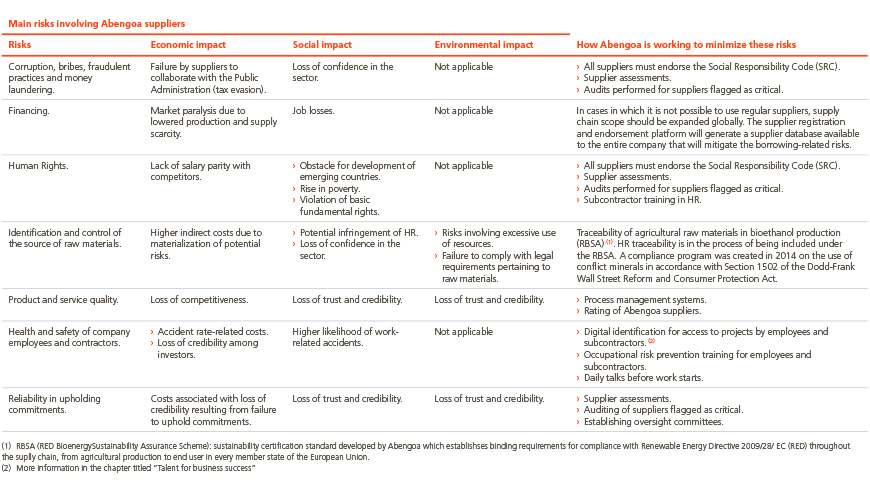
We understand the trickle-down effect of responsible management on supplier and contractor activities and therefore one of our main objectives is to extend our principles and values to the supply chain
Managing the supply chain
Abengoa is conscious of its responsibility in the supply chain and therefore finds it necessary to implement and promote high standards of social responsibility across all of the company’s lines of activity. Abengoa promotes the principles undertaken with the Global Compact, those included in the Declaration on Human Rights, the Global Reporting Initiative (GRI) and in the company’s own Code of Conduct and ensures compliance with all these, while engaging company suppliers in a relationship based on trust and mutual benefit.
In other words, the company works to ensure the existence of suitable conditions of health and safety, respect for HR in all regions, ensuring non-corrupt practices and sound use of natural resources (effective environmental management), while upholding quality standards applied to products and services.
To this end, Abengoa provides its suppliers and contractors with the means needed for them to comply accordingly with these principles through training and mandatory adherence to the following initiatives, among others:
Supplier emissions reporting for the greenhouse gas (GHG) management system
Abengoa requires that all of its suppliers sign an agreement to implement a GHG emissions reporting system, meaning all providers are required to provide information on the CO2 emissions linked to each order that the company places with them.
In cases where this information is not available to a supplier, the company grants a six-month period for implementing an emissions reporting system for the goods or services it provides.
Signing of the Abengoa Social Responsibility Code
With the aim of gearing its business toward deeper integrity and respect toward those who may be affected by company activities, Abengoa requires all providers the company works with to adhere to the Social Responsibility Code for Suppliers and Subcontractors. Comprising 11 clauses, this code is based on the principles of the United Nations Global Compact and inspired by the international SA8000 standard.
In addition to governing supplier activity through the code, by signing this agreement suppliers also agree to being fully available to undergo an Abengoa audit or other type of inspection for verifying compliance with the principles.
During 2014, 2,018 agreements with suppliers were undertaken.
Labor Social Responsibility Policy and management system implementation
Abengoa’s Labor Social Responsibility (LSR) management system was designed on the basis of the SA8000 standard, meaning that 100 % of Abengoa’s companies have a certifiable system in accordance with this norm in place. Optionally, companies may be certified individually. All companies that belong to the Industrial Production area of activity and the company tasked with managing HR policies and procedures are SA8000 standard-certified through IQNet.
The system ensures that the company has the necessary tools to move forward with implementation of the ten principles of the United Nations Global Compact, endorsed by the company in 2002 and which involves not only Abengoa, but also its supply chain.
Among the objectives of this management system is to engage suppliers and contractors in compliance with Abengoa’s LSR directives, establishing supplier selection and evaluation procedures based on the concept of social responsibility, in addition to developing control mechanisms for ensuring observance of this policy.
Training
Abengoa works with both large and small suppliers. As the company is aware of the difficulty that emissions accounting may pose for some providers, and in pursuit of good practices, the company conducts training sessions to provide suppliers with guidance along these lines.
In addition, the company provides training relating to occupational risk prevention and other aspects such as effluents, spills and waste.
235,457 hours of training were dedicated to suppliers in 2014
Responsible procurement system
In order to fulfill the commitments established with regard to its supply chain, Abengoa continues to develop a system for responsible management of the purchases made by the company. This process was designed to be approached in different stages depending on the level of criticality. It was initially necessary to design system methodology, considering the manner of conducting supplier evaluation and rating, as well as the types of audits to be conducted. The company is presently working on process automation through a supplier registration and approval platform which will enable supplier assessment to be carried out with a global scope.
The system includes sustainability criteria applied to the evaluations carried out among suppliers and is made up of tools and procedures that enable Abengoa to analyze the level of risk of its suppliers. By conducting internal audits, Abengoa seeks to forestall any conduct which may run contrary to the performance principles established by the company.
Implementation of the system is being carried out in three phases: supplier assessment, critical supplier audits and supplier rating.
1. Supplier assessment: risk identification and management
Abengoa treats supply chain sustainability as a management framework that enables the company to mitigate risks and identify opportunities. It is therefore a key element for the company’s reputation.
Risk suppliers therefore undergo a yearly analysis to evaluate the supply chain in Abengoa operations, monitoring involvement in and acceptance by suppliers of corporate policies, determining risk level and establishing mitigation measures.
This analysis takes into account different variables, including the supplier’s country, the nature of the product or service supplied or the type of activity conducted, as well as more subjective aspects deriving from the company’s knowledge of its suppliers. To determine the level of risk of the country of supplier operation, Abengoa employs recognized international indices related to human rights (child labor, discrimination and freedom of association, among others), corruption and observance of political and civil rights.
In 2014, supplier analysis was updated to ensure a more exhaustive assessment of the supply chain. To this end, further social and environmental aspects were included, raising the number of criteria to be taken into account when performing assessments from 7 to 19.
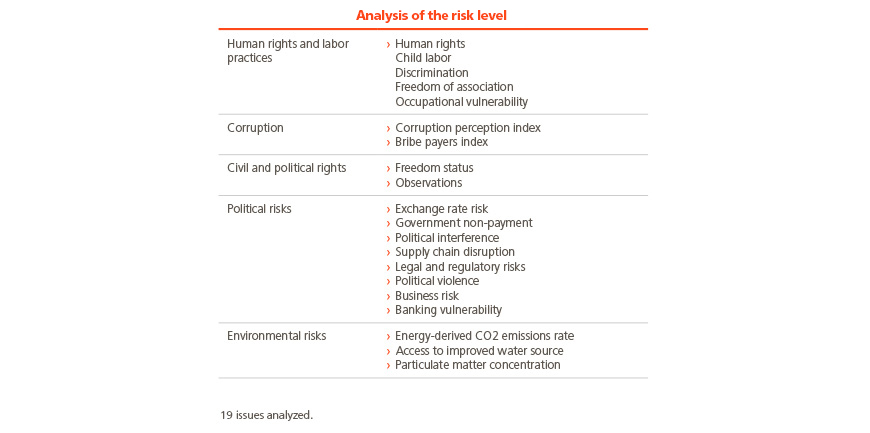
2. Supplier audits
 The aim of this phase is to determine the degree to which Abengoa suppliers are ensuring compliance with the principles set out in the Social Responsibility Code (SRC). For this purpose an auditing procedure was created to define the aspects to be reviewed and to base the scope of the work on the degree of supplier criticality, allowing analyses to be carried out via self-assessment questionnaires, remote audits or in-person audits that include visits to supplier facilities.
The aim of this phase is to determine the degree to which Abengoa suppliers are ensuring compliance with the principles set out in the Social Responsibility Code (SRC). For this purpose an auditing procedure was created to define the aspects to be reviewed and to base the scope of the work on the degree of supplier criticality, allowing analyses to be carried out via self-assessment questionnaires, remote audits or in-person audits that include visits to supplier facilities.
All Abengoa companies are responsible for analyzing and evaluating the risks inherent to the activities carried out by their suppliers. A target was set for 2014 to conduct audits for at least 5 % of the suppliers flagged as critical or otherwise high-risk4.
A supplier audit guide was devised in 2014. This document contains general guidelines to be taken into account when conducting supplier audits. The medium-term objective was set to define all aspects and procedures involving supplier audits as a NOC.
3. Supplier rating
The last phase of this process consists of rating suppliers in terms of the assessment performed. This enables Abengoa to reward best practices and exclude providers that fail to comply with the requirements established in the SRC.
The results of the process are as follows:

Nota 4 High-risk suppliers: suppliers operating in high-risk countries or those engaged in an activity classified through analyses as being of high risk.
Critical suppliers: high-risk suppliers who, when taking other criteria related to image and the media into consideration, entail higher reputational risk.

Supplier audits
Over the course of the supplier audits conducted in 2014, some cases of non-compliance were detected, mainly in relation to compliance with legal requirements associated with health and safety: lack of worksite physician, failure to conduct a first-aid course, lack of an evacuation plan, lack of an occupational risk prevention program, etc.
One of the cases detected involved training of the operators in charge of the firefighting department at the facilities of a supplier to the bioenergy business in Brazil. Once this case of non-compliance was identified, consisting here of a lack of courses and drills, Abengoa contacted the supplier and monitored resolution of the problem based on the observations made.
When a case of non-compliance is detected, Abengoa establishes a plan of action that results in collaborative work with the supplier in order for them to be able to adapt to the established requirements. The goal is to work together with suppliers in order to resolve non-compliance, while seeking to convey responsible performance to the supply chain.
In 2014, 64 audits were performed, including 38 conducted on-site through visits to supplier facilities, and 26 carried out remotely.
Abengoa’s may end its relationship with any supplier that demonstrates “non-compliance”, unless the incidents detected are rectified. There were no cases of Abengoa severing commercial ties with any suppliers in 2014.
Supplier registration and approval platform
Abengoa has been working since 2013 on creating a supplier registration and approval platform to enable the company to systematize all phases of the existing Responsible Procurement System described in the previous section. The primary objectives of this project are as follows:
- To establish a standardized authorization process for all Abengoa suppliers, including sustainability criteria and taking into account the geographical and operational diversity in the operations conducted by the company.
- To lower the risk involved in procuring goods and services, maintaining or improving agility by setting up efficient administrative processes.
- To carry out more exhaustive evaluation of the supply chain, generating an assessment and rating for every supplier in order to reward excellence and penalize a lack thereof (severing commercial ties). The purpose of this model is to quantify the relative position of suppliers according to the way they manage social responsibility affairs so that this can be taken into account when tendering or contracting with them. Some of the auditing processes will likewise be automated to make the process of selecting suppliers to be audited more efficient.
- To facilitate more effective communication thanks to a single database containing information on suppliers, which can be consulted by anyone looking to place orders with these suppliers. The suppliers will in turn be assigned a single contact person to whom they should send their information.
Platform launch and implementation will take place gradually, with a pilot phase in Spain (2015) and progressive deployment according to region.
The supplier platform will feature an audit module that allows audit information and results to be shared across group companies. This will provide the company with information on incidents detected and observations stemming from the auditing process, as well as the action taken, including the ability to block suppliers that fail to meet the requirements in place.
These audits will enable Abengoa to carry out more exhaustive assessment of supplier activities.
Locally-based suppliers
 Abengoa is heavily committed to the economic and social progress of the communities where it operates and therefore seeks to drive wealth generation in the countries where the company is present by implementing and developing economic relations with local suppliers.
Abengoa is heavily committed to the economic and social progress of the communities where it operates and therefore seeks to drive wealth generation in the countries where the company is present by implementing and developing economic relations with local suppliers.
Working with locally-based partners enables the company to strengthen and support a stable local economy, helping improve living conditions in the areas where it carries out its activities through direct and indirect job creation and by indirectly attracting investment.
The percentage of purchases made from locally-based suppliers totaled 76 % in 2014 (78 % in 2013 and 82 % in 2012).
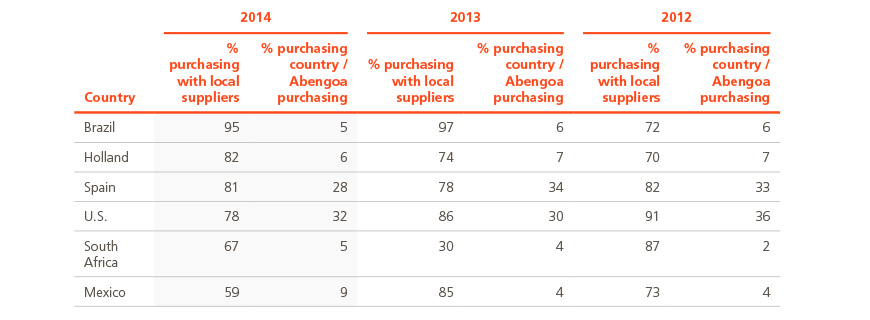

Abengoa, we provide innovative technology-based solutions for sustainability that help lower the impact of our customer´s activities
A complete range of products and services to meet customer needs
Abengoa works to fulfill the needs of its customers by maintaining fluid, transparent communication to achieve more effective management and minimize impacts.
In a way that parallels the case describing suppliers, customers underwent further scrutiny in 2014 through a materiality study to identify the most relevant issues at each point of the value chain. The process yielded a set of risks and impacts which the company strives to mitigate through the initiatives described below:

Respect for clients and quality of the products and services provided by the company are company hallmarks and underpin the daily efforts of the team of people who make up the company. Over the course of the year, through the formal communication mechanisms in place at Abengoa, there were no reports of either fines or sanctions in relation to customer privacy or non-compliance with regulations involving product and service provision and use. Likewise, there were no reports of any incidents involving communication or marketing.
Client satisfaction, our priority
For Abengoa, fulfillment of its commitments and a focus on full client satisfaction drive all company endeavors and embody all Abengoa projects, products and services.
This approach to business is verified by accredited entities to assure that the company’s management systems are compliant with international standards such as ISO9001 , which ensures that company processes are aimed at improving client satisfaction year after year.
Each group company has a management system in place to gauge and evaluate client satisfaction by addressing any suggestion or complaint as quickly as possible. All complaints are rigorously reported, with an individual in charge of the matter assigned to resolve each one and identify the underlying causes, implementing the corrective measures need to prevent reoccurrence.
In addition, after client satisfaction and the effectiveness of the corrective steps taken have all been analyzed, action plans are implemented to maintain the highest degree of satisfaction among all Abengoa clients.
The score for overall Abengoa client satisfaction in 2014 was 73 points on a scale of 1 to 100, and the percentage of responses received totaled 73 %.

The fluctuation in percentages is due to the creation of new companies. A period of time is needed between their creation and implementation and certification of quality management systems.
Note 5 ISO 9001: international certification of quality management systems.
Tools for managing customer satisfaction
Abengoa has tools in place for effective monitoring of commercial matters through real-time communication across the organization to facilitate decision-making.
Commercial Action 3.0: application which provides daily updates on client management and commercial processes in progress. In 2013, a complete revision of the application was performed so as to streamline the management process and facilitate use of the application via mobile devices.
Salesforce: a computer application was created in 2014 for managing future businesses. It allows the commercial network to optimize processes by reporting opportunities detected anywhere in the world (all application users have access to information on such opportunities to monitor their evolution). This enables coordination between the different regions so as to have up-to-date, global information available for setting and monitoring commercial targets.
Abengoa Easy Management: this corporate application was implemented over the course of the year to manage any company action plan and to report incidents and the corresponding corrective measures taken. The instrument was designed to reflect Abengoa’s reality, which has led to improvements in managing tasks and teams with a significant advancement in the model for managing knowledge management and lessons learned through employee experience and relations with other stakeholders. This standardized management provides consolidated information that is broken down by business, area, etc., which facilitates strategic decision-making and aids in establishing specific policies for moving forward in a culture of excellence and increasing client satisfaction.
![]()
Abengoa’s relationship with society
Given that the company conducts its activities in 57 countries, with upward of 24,000 employees spanning the entire globe, Abengoa undoubtedly has a high impact on society, as does society on the company. Accordingly, the company seeks to improve its impact on society and thereby minimize risks.
In relation to the positive impacts Abengoa generates for society, and as described in the chapter titled “Business Model”, the company provides water desalination, reuse and pipeline solutions to offer access to drinking water in regions in which water supply has been unfeasible until now. It also generates electrical power using renewable sources; ensures access to electricity in remote regions through transmission lines and promotes sustainable transportation through bioethanol production.
Abengoa, through its energy activity, seeks to impact positively in the local community and the environment. In 2014, the company’s main projects under construction or in operation resulting in public benefit were the following:
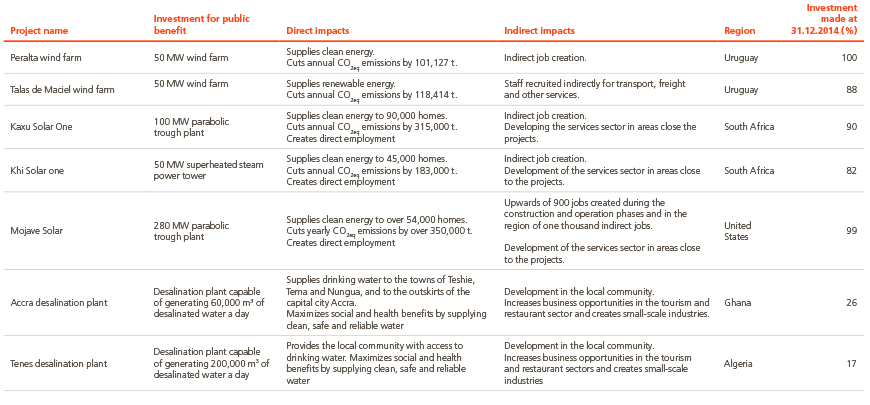
Abengoa projects must be consistent with the mission and vision of the company and therefore its business model based on sustainable development. Therefore, it is essential having a methodology to manage ( prevention and mitigation ) any possible negative impact that may arise from their projects , designing appropriate preventive and corrective measures to each situation6.
From the perspective of society’s potential impact on Abengoa, as defined in the materiality analysis7, there are issues that are crucial for Abengoa and which have to do with how company activity is affected by different social agents.
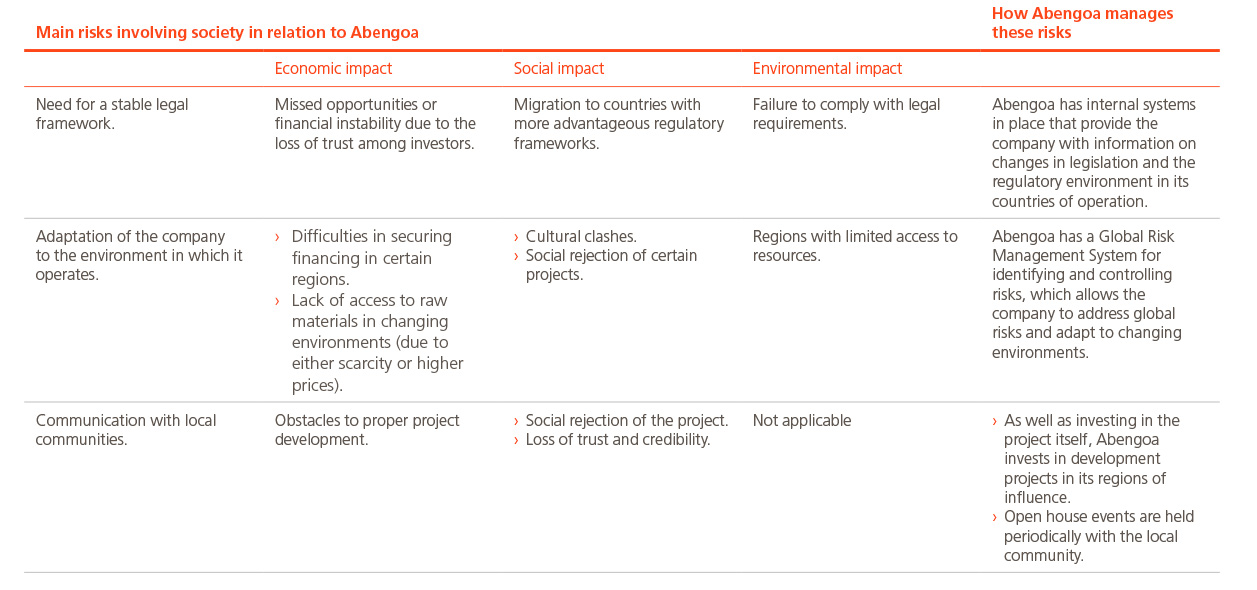
Note 6 More detailed information about impacts and mitigation measures in some of the most important projects of Abengoa in Appendix C.
Note 7 Further information can be found in the chapter titled «About this report».
Mechanisms for protecting human rights
Abengoa seeks sustainable growth based on respect for human rights, both within and outside the company, and throughout the company’s value chain and sphere of influence.
To uphold this commitment, the company embraces and integrates into its activities the principles which govern the United Nations Universal Declaration of Human Rights, the SA8000 standard and the principles included under the Global Compact and OCDE guidelines
Abengoa also categorically condemns all forms of child labor in accordance with Convention 138 of the International Labor Organization (ILO) on minimum working age.
As a multinational company Abengoa develops systems for controlling and preventing human rights violations. Along these lines, the so-called Common Management Systems were developed to ensure that the company upholds these commitments. The systems establish norms of obligatory compliance for all company employees, with no exceptions and regardless of where activities are conducted.
The company also has a Universal Risk Model (URM) to ensure proper management of the risks associated with violations of human rights in company activities or in supplier operations. Other mechanisms designed to protect human rights include the whistleblower channel, adherence of company providers to the Social Responsibility Code (SRC), control visits to verify proper system implementation, monitoring of Abengoa companies deemed material, committees on human resources, compliance, internal auditing and corporate social responsibility, specific training and internal non-financial audits.
There were no activities or incidents in 2014 that implied risks involving discrimation, freedom of association, child labor or forced labor.
The internal NOC pertaining to human resources lists all of the aspects relating to policies, principles and commitments in connection with labor practices, human rights, diversity, equality, personnel recruitment and training, industrial relations, professional development and compensation, occupational risk prevention, the Labor Social Responsibility (LSR) management system, the Code of Conduct and the whistleblower channel, among others.
Abengoa’s compliance program was implemented in 2014 in the form of a new NOC, mandatory throughout the company and subject to control procedures. The NOC ensures compliance with all norms undertaken obligatorily or voluntarily by the company for the purpose of preventing, controlling and rectifying situations of potential non-compliance and the risks associated with these.
The Abengoa Code of Conduct contains guidelines and measures for preventing incidents from occurring in relation to infringements of human rights or other company values. The company also demands the highest standards of honesty and ethical conduct, including procedures for handling professional and personal conflicts of interest.
The entire company is called upon to take the initiative in improving business processes and working and environmental conditions, and in resolving problems. To this end, the company promotes the use of a range of instruments and computer applications, including Abengoa Easy Management, suggestions via the Employee Portal and satisfaction surveys.
Note 8 SA8000: international certification establishing minimun conditions for engagement in socially responsible labor practices that bring benefits to the entire supply chain.
Note 9 Convention 138 of the International Labor Organization (ILO): Convention concerning minimum age for admission to employment (date of enactment: June 19, 1976). (+info)
The development in the social communities in which the company operates is essential to Abengoa
Positive impact on local communities
Abengoa believes that working alongside the local communities where it operates and invests in development and growth reaps benefits that go beyond economic returns, and views this as an indispensable part of the company’s social license to operate . This intangible is something that companies should protect above everything else because it is extremely difficult to obtain.
Abengoa’s social engagement is channeled through the Focus-Abengoa Foundation. The foundation has been working for over 30 years to advance social and cultural development in the communities where Abengoa is present.
In 2014, the company made the decision to report its social performance in line with the criteria proposed under London Benchmarking Group (LBG) methodology. This model provides a system to measure, manage, assess and report contributions, achievements and impacts of the company’s social action on the community, which improves information transparency and comparability.
In 2014, investment in social engagement was € 9.5 M, up by 4.4 % year on year to reach 0.13 % of company sales for the year.

Girls in Nani Singloti Mission.
Gujerat. India.
![]()
Note 10 Social license to operate refers to the acceptance of a project (be it commercial or non-profit) by a community. This license is linked to local perceptions with respect to the organization and therefore involves transparency, honesty, respect, ethics and impact mitigation efforts carried out by the company.
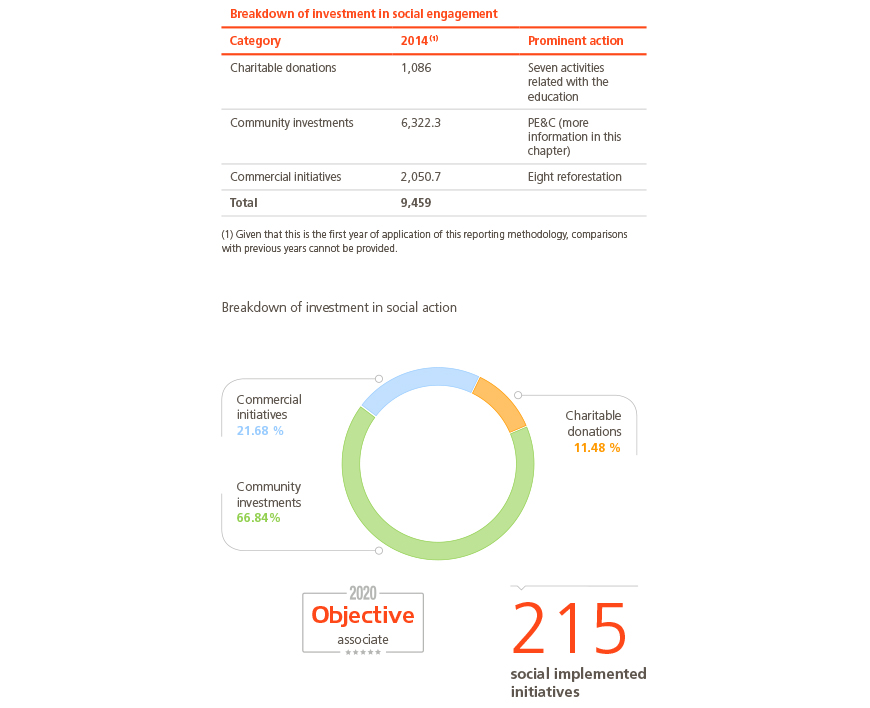
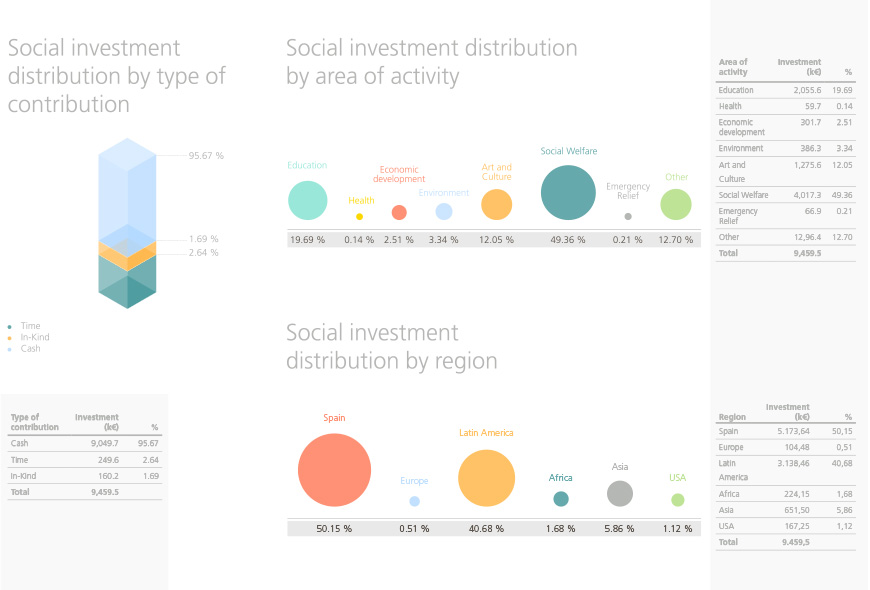
Together with the Focus-Abengoa Foundation, Abengoa has established courses of action that provide the foundations for the company’s social engagement efforts: supporting culture, social development and education and research.
Supporting culture
Recovering Sevillian Baroque heritage and making it available to society.
Highlight initiatives carried out in 2014:
- In 2014, the foundation lent the “Santa Rufina” and “Inmaculada” works by the Sevillian painter to the Velázquez exhibitions held in Vienna and Paris.
- The 11th edition of the Baroque School was held. Entitled “Enterprises and Entrepreneurs in Baroque Times”, the event provided an overview of the role played by both economic actors during the period, which was considered the first globalization of markets and their role in relation to art heritage and the art market according to the principles of European capitalism in the 17th and 18th centuries.
- Acquisition of the Bartolomé Esteban Murillo painting titled “San Pedro Penitente de los Venerables”, marking its return 200 years later to its place of origin after being stolen in 1810 from the Hospital de los Venerables, the current headquarters of the Focus-Abengoa Foundation, as part of the pillaging that occurred during Napoleon’s invasion.
In 2014, the Focus-Abengoa Foundation also awarded the following awards in relation to art and culture:
Alfonso E. Pérez Sánchez Award.
The Alfonso E. Pérez Sánchez International Award was unveiled in 2009 with the aim of promoting study and research of Spanish Baroque art and its influence in Europe and America. The competition is aimed at the entire scientific community and is held every two years.
Award for the best doctoral thesis on a theme related to Seville.
Established more than 30 years ago in collaboration with the University of Seville, the award recognizes outstanding research work and includes publication of the winning entry. This raises the exposure and prestige of the chosen researcher and therefore improves his or her future professional options. The winner of the prize in 2014 was Juan Fernández Lacomba for his work titled “Pintura de paisaje y plein-air en Andalucía: 1800-1936. Procesos culturales y corpus global”.
The aim of this accolade is to raise public awareness of emerging painters, help develop their professional careers and foster an exchange of artistic and cultural experiences. Once the contest has ended, a temporary exhibition is held featuring the works selected by the panel of judges, which are displayed in Hospital de los Venerables in Seville. The award is international and multidisciplinary, welcoming the use of any painting technique and subject matter. In 2014, the prize was awarded to a painter hailing from Madrid, Óscar Seco, for his work titled “Little Nemo in Secoland”.

Little Nemo in Secoland, work awarded the International Painting Prize.
![]()
The Javier Benjumea Puigcerver Research Award.
The Javier Benjumea Puigcerver Research Award was set up in 2003 and is aimed at doctors, graduates and degree holders from the University of Seville and anyone who is or has been associated with the university. The 11th edition of the award program was held in 2014, and the prize was handed to Ernesto Carmona Guzmán, professor of inorganic chemistry at the University of Seville, and Jesús Campos Manzano, post-doctorate researcher at the university, for their work entitled “Catalytic incorporation of deuterium and tritium in hydrosilanes. Isotopic marking of organic molecules of biochemical and pharmacological interest”.
In 2014, our employees conducted 11,521 hours of volunteering, up 10.3 % on 2013
Social Development
Socio-economic development of the communities and regions where Abengoa has a presence through its projects and offices.
PE&C
A flagship initiative of the Focus-Abengoa Foundation is the “PE&C: People, Education and Communities” social development program. The program embraces the mission of social development through education.
The program was unveiled in 2005 in Argentina and is currently being implemented in nine regions: Peru, Brazil, India, Mexico, Chile, Spain, Sri Lanka and South Africa (the latter two offices were opened in 2014). New locations were also opened during the year in countries where the initiative was already active, namely in Chile (Maria Elena community, Atacama Desert), Mexico (communities in the state of Tabasco) and Peru (the Santa Rosa and Pachma communities in the western region of the country).
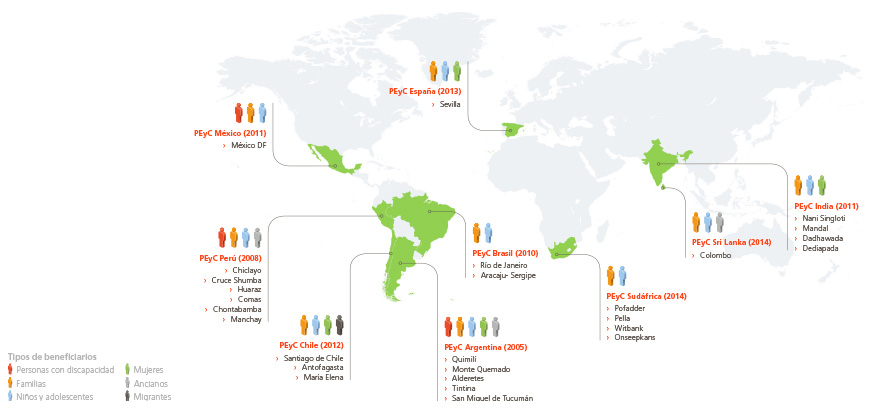
In these geographical regions, the program relies on education to foster the integration of the most vulnerable social groups: children, women, senior citizens, disabled persons or families in situations of poverty or social exclusion in 2014 the program had 5,795 direct beneficiaries.
The PE&C is a program with its sights on long-term gains, always working alongside local organizations to ensure that the specific characteristics and needs of each community are duly taken into acount.
The company’s social development programs must respond effectively to the needs of the communities where they are implemented. It is essential to conduct exhaustive monitoring and follow-up periodically to be able to detect areas for improvement and ensure that programs are fulfilling anticipated objectives.
Abengoa has three basic tools for this purpose:
- The aforementioned LBG methodology, applicable to all projects and initiatives.
- SROI (Social Return on Investment) Assessment. In 2011, Abengoa devised an instrument based on the SROI model which enables the company to analyze the impact of and return on its social development programs on an annual basis. This analysis is used to evaluate PE&C projects, given their complexity and long-term nature. In 2014, analysis was conducted on 6 of the 9 program sites in place.
- Annual community engagement plans and approval procedure. Each year Abengoa subsidiaries must draw up social engagement plans in which every action carried out must undergo a specific authorization process which is finalized with approval from the company’s chairman following analysis performed by the CSR director.
In order to engage employees and their families and friends and the community at large in these initiatives, a program was created to promote volunteering in the range of educational and cultural activities organized. In 2014 Abengoa’s employees realize 11,521 volunteering hours.The network of volunteers is structured into two major categories:
- Cultural volunteering: aimed at young men and women who are either pursuing or have completed their university degrees in disciplines linked to the theme and/or activity in which they wish to participate. This initiative also features a special volunteer program for citizens over the age of 65 who wish to devote some of their spare time to promoting and disseminating the heritage of the city of Seville. To coordinate the program, the Focus-Abengoa Foundation participates in the “Senior Cultural Volunteer Program” promoted and coordinated by the Spanish Association for Senior Citizen Classrooms.
- Social volunteering: social volunteer work is supported directly by the PE&C social development program and is geared towards people who wish to collaborate on program activities. There are different ways to get involved:
- Volunteering vacations. Abengoa employees, along with a companion, have the chance to spend part of their vacation time at a PE&C program headquarters and thereby collaborate on site in the project by helping different program beneficiaries.
Note 11 Program sites assessed using SROI methodology in 2014 (applying a 2013 base year and 2013 outcomes) were the following: Argentina, Peru, Brazil, India, Mexico and Chile. The remaining program headquarters, located in Seville, South Africa and Sri Lanka, did not have the maturity needed to undergo this assessment.
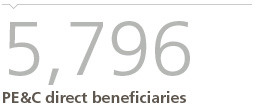
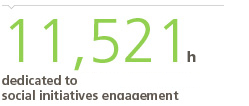
- Job pool. This volunteering option is supported by a computer application through which PE&C coordinators periodically upload jobs requiring help that can be carried out by employees without having to leave the office.
- Monetary donation. Monetary contributions can be made to any PE&C project through a computer application.
- Corporate volunteering. In geographic regions where there is a PE&C headquarters, Abengoa employees and their family members can carry out hands-on volunteering. The program prepares an annual calendar of activities for people to participate in.
Education and research
Furtherance of education and scientific research on the subject of renewable energies and climate change
The Forum on Energy Transition and Climate Change was inaugurated in 2014. This initiative was conceived with the aim of raising social awareness of the importance of energy transition in migrating from fossil fuels to renewable energies. It has become an central pillar of the Focus-Abengoa Foundation, which has rolled out a series of measures and activities aimed at bringing about a change in the current energy model.
The forum is aimed at university students, professors and sector practitioners, and more generally to all citizens interested in these matters.
Over its first year of existence, the forum engaged in the following activities:
Development of the forum website, the forum’s principal instrument of dissemination containing information on the importance of energy transition and climate change, etc. Noteworthy among its sections is the forum blog, where summaries of current topics are posted, as well as a monthly editorial analyzing a problem or theme of relevance during the month and, finally, a variety of articles providing in-depth coverage of specific issues.
Opening conference, held in May in Seville and delivered by Lord Nicholas Stern, president of the Grantham Research Institute on Climate Change and the Environment, former economic director of the World Bank, and author of the “Stern Review on the Economics of Climate Change”. The opening lecture was attended by around 200 people and the other presentations enjoyed attendance of around 80 people per day.
Road to Paris 2015. The ‘Road to Paris 2015’ event took place in November in Madrid, with the first round table session discussing the state of international climate change negotiations and the prospects for an international agreement in Paris in 2015. The purpose of the seminar, to be held every three months, is to promote, through dialog with a variety of experts, a change in the energy model in Spain and provide support via public opinion.
International seminar on renewable energies as an instrument for combating poverty. This event took place at the Loyola University of Andalusia in November and, like the other initiatives carried out by the forum, its objective was to observe and analyze what is happening in the world regarding energy transition and disseminate the information. Those in charge of delivering the training sessions were experts from the university and research sector, in addition to members of prestigious foundations, Spanish agencies, and Abengoa executives, among others.
In addition, the Focus-Abengoa Foundation continues to promote and further education through agreements held with nearly 30 academic institutions, five of which are located in Latin America and the rest in Spain. It also works on the scholarship and award program for employees and their family members.
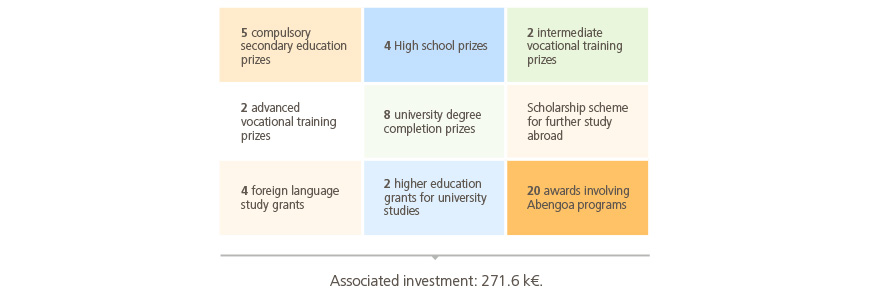
During 2014 we spent € 271,690 to awords and grants
Contribution to the community: wealth creation
In 2014, the social cash flow was € 7.4 M,
